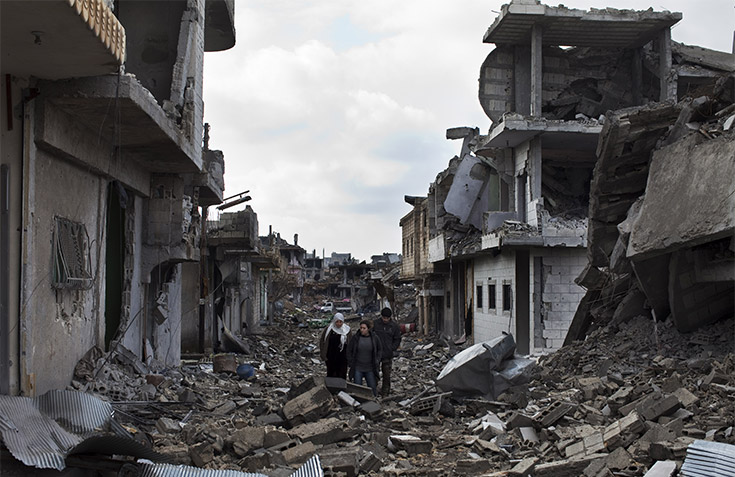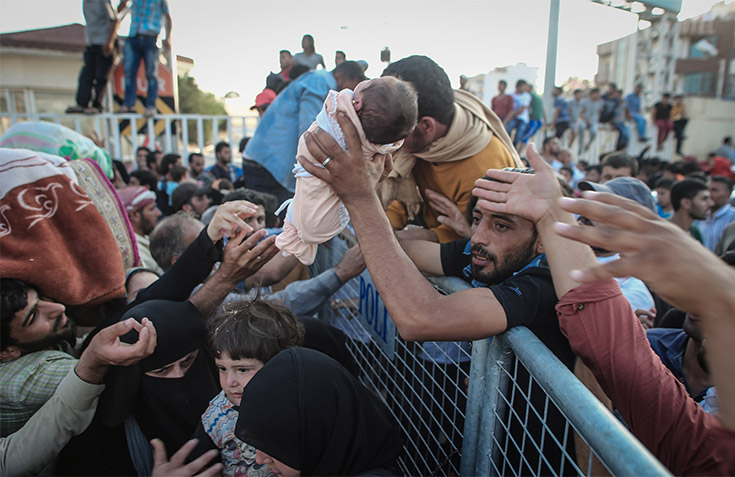Comment: ISIS takes a gamble
The so-called Islamic State is gambling on both the political and military fronts with its intention to declare a new state, but rather than being the precursor to some major regional crusade, Patrick McIlwee says we will see even more factionalism and infighting, with the sad effect that Western countries will see further radicalisation of certain sectors of its youth and the export of potential terrorism

People walk amid the destruction in Kobane, Syria, after coalition forces clashed with ISIS. Phase one of Mao's doctrine of guerilla war is to begin action in an area of weak or unpopular governance (USA/Rex/Shutterstock)
Say ‘ISIS’ to me a few years ago and I would have presumed you were talking about one of the Gods of ancient Egypt. Today of course we all think of the, so-called, Islamic State of Iraq and the Levant or, as it is now trying to rebrand itself, simply IS – the Islamic State.
But coming from virtually nothing to a position where it is attempting to declare a new state – the Caliphate – as well as demanding the loyalty of all Muslims worldwide and, incidentally, challenging Al-Qaeda for leadership of the ‘jihad’, has this organisation overreached itself?
The well-known terrorism expert J M Berger stated that The: “ … declaration of the Caliphate is a gamble,” and this author is not only inclined to agree, but to consider it a very foolish and unnecessary wager. Certainly big winnings are up for grab,s but the cost of the bet could well be high and the odds are long. Let’s examine the situation.
Arising from an amalgamation of groups and militias in Iraq after the turmoil of Saddam’s deposition, IS has spread out and actively controls large swathes of Iraq and Syria, with a significant presence (covert or otherwise) in Southern Turkey, Jordan, Lebanon, Gaza, Saudi and even Indonesia. Whether or not it has influence in Northern Nigeria depends on what credence you give to the Boko Haram claim of ‘allegiance’. Personally I do not count it as significant at all and merely a not-so-grand ‘gesture’.
The gamble that ISIS is taking is not only on the military front – although we shall look at that in a moment, but on the political front. It is actually the political front that may bring the greatest ‘rewards’, but which is also the riskiest.
First let’s consider the military side of things. Chairman Mao proposed a doctrine of guerrilla war that was split into three parts or phases. It has been claimed that this doctrine was, and has been, adopted by the Viet Cong, Taliban, the Sandinistas, Tamil Tigers and the IRA (although in the case of the IRA this claim does not really stand up to scrutiny).
Phase one is to begin in a place where the control of the central government is weak, unpopular or, preferably, both. This is often a remote rural area. Guerrilla attacks hope to further weaken government control and lead to a partial or full withdrawal. No, this is not what the IRA attempted in the ‘Bandit Country’ of South Armagh or in the Belfast ‘no-go’ areas – these discussions are for another time and place.
Phase two is to establish enclaves of control where the terrorists/revolutionaries/freedom fighters (select your preferred term) have, in effect, become the alternative government.
Phase three involves launching a full-scale assault against the state. This phase is almost normal conventional warfare. (Journalist Fouad Hussein in a 2005 book based on interviews with Al-Qaeda leaders https://en.wikipedia.org/wiki/Fouad_Hussein spoke of a seven phase strategy but upon analysis this is simply a variation on Mao’s much more succinct theory).
There are, of course and almost by necessity, many variations on this model. Is the state primarily rural or urban? How much popular support does each side command? One thing all these variants have in common is that the transition from one phase to another must be timed very well indeed or it may lead to huge losses.
We can see examples of this model and its degrees of success. Probably the first to look at is the success of the proponent of the doctrine itself, Chairman Mao. History records that he won, so it must have worked, isn’t that so? Well, ultimately yes, but don’t forget the period of the ‘Long March’ in 1934/35 where, after forming the Jiangxi Republic (see phase two above), the state forces of the Kuomingtang basically crushed the rebel Jiangxi forces, compelling Mao to break out with 100,000 followers. Although this Long March has been the subject of much propaganda spin it was no more a victory than Dunkirk and represented a very lucky escape from complete annihilation.
In 1916 the Irish Rebels went straight to seizing fixed positions (mostly in Dublin). Once they were isolated and surrounded by the British forces, the outcome of the struggle was never in question. Contrast this with the War of Independence 1919-21, (often called the ‘Tan war’ owing to the use of British auxiliary troops in ‘Black and Tan’ uniforms) where flying columns struck at occupying forces and then retreated and dispersed; it was only in the later stages that towns and villages were seized. It is debatable whether a serious attempt would have been made to hold these gains in the face of a determined assault by British forces. These lessons of 1916 had been learned well. The Treaty, ending the war on a basis that has left a legacy even until today, meant that there was nothing that resembled a phase three in this struggle.
The Tamil Tigers seemed to follow the model better. But once they, in effect, seized and controlled sufficient ground to form an alternative state – phase three – it led to their defeat. Mao once said: “The guerrilla must move among the people as a fish swims in the sea.” No longer were police or other security forces looking for a terrorist cell hiding in the midst of a massive civilian population. Rather the Tamil Tigers were in fixed positions in bunkers and trenches with recognised front lines.
If I have heavy artillery, I would certainly prefer my opponents to be sitting in a fixed position instead of mixing with my own people. The Sri Lankan state had to deal with a considerable amount of political and international opinion fallout after its war, owing to its shelling of so-called safe zones. It can be argued effectively that the move to phase three ultimately led to the defeat of the Tigers. Yes, they had their reasons for moving to this phase of the struggle but they did not fully anticipate the consequences of doing so and paid the price of failure and miscalculation.

Desperate refugees fleeing fighting in Syria: Refugees are bad news for any group moving to phase three of a Maoist struggle, as it means they are not 'replacing the state', merely gaining ground (ZUMA/Rex/Shutterstock)
ISIS has fully completed phase one and most of phase two. It has attacked major towns in Iraq and holds cities in Iraq and Syria, leading to streams of refugees from these areas.
Refugees are bad news for any group moving to phase three of a Maoist struggle, as it means you are not ‘replacing the state’, merely winning ground. Also the government forces now know where to find you and there is no civilian shield to give you a propaganda or political victory if a full military assault is launched against you.
ISIS has certainly expanded rapidly, but primarily into areas already weakened by civil wars. I have not forgotten about its presence in bordering areas mentioned above, but those areas are arguably in the early stages of Mao’s phase one. In the face of a determined assault, can these areas be held, or has ISIS, in effect, stood up in the open with a big red bull’s eye painted on its metaphorical chest? Countries are conducting air strikes against the group and Saudi Arabic has (to the delight of some and the scepticism of others) formed a 34-nation coalition against ISIS. The notable absence of Iran and some of its friendly/client states raises more than a few questions but, even so, it is further significant opposition to the group.
So why did it do this? Was it pure hubris after a run of success – a repeat of the Japanese victory disease after its initial conquests in WW2? Or is it a political gamble? We must now consider politics.
Under strict interpretation of Islamic law only a Caliphate can declare and lead a Jihad – a holy war. If the implications of this are not clear, the ISIS statements claiming the loyalty of ALL Muslims and the leadership of the ‘Jihad’ should be more so. Those who do not support the Caliphate are the ‘enemies of Islam’. And this would include Al-Qaeda, as well as all Shia Muslims.
In addition, the stated boundaries of the Caliphate (and just look at the many maps being circulated on the internet towards late July) are going to raise eyebrows, hackles and very legitimate fears in nearly every bordering country. This is not a political formula for making friends and influencing people. For those who argue that terrorists are not about making friends, consider the list of campaigns won by the insurgents where they did not have the support of, at least, a large section of the people. Trust me, it’s a short list.
So why is it provoking this? About the only advantage can come if the West overreacts. If the USA decides to intervene and crush the ‘Caliphate’ – and there is no doubt whatsoever that it has the capability to do this and do it with ease – it would ‘legitimise’ the position of ISIS. It could claim propagandistic value in saying the Caliphate had been destroyed by the ‘Great Satan’ so all Muslims should flock to defend and restore it.
Having learned the lessons of Afghanistan (we hope), the USA has shown little desire for much direct involvement, nor do I think we shall see very many American boots on the ground. President Obama stated this previously and, in late October 2015, went to pains to state that the dispatch of 50 special forces troops to Syria was not a breach of his promises. Advisors, airstrikes and drones, but no commitment of divisions…
It might be argued that the very conditions that allowed ISIS to reach its present position are the very factors that preclude its victory. After all – what exactly are its ‘war aims’? They may seem clear at first but then so did the war aims of the Irish Rebels in the War of Independence in 1921/22. Yet soon after the treaty a vicious civil war erupted. The greatest victims of ISIS are arguably its own people and supporters and in Jan 2016 we were disgusted by the story of the fighter forced to execute his own mother for questioning the ‘cause’.
So I do believe that rather than the precursor to some major regional crusade we shall see even more factionalism and infighting, which demonstrates significant failure of the political gamble.
Sadly the net effect of this on many western countries will be the further radicalisation of their Muslim youth and the export of potential terrorism, but that is a story for another day.
Patrick Mcilwee is a Senior Fellow of the Business Continuity Institute (BCi), a Fellow of the Institute of Civil Protection & Emergency and has over 20 years experience in the field of Business Continuity and Disaster Management. He has been involved in the operational responses to over 4752 incidents within the UK and overseas
Patrick McIlwee, 13/01/2016